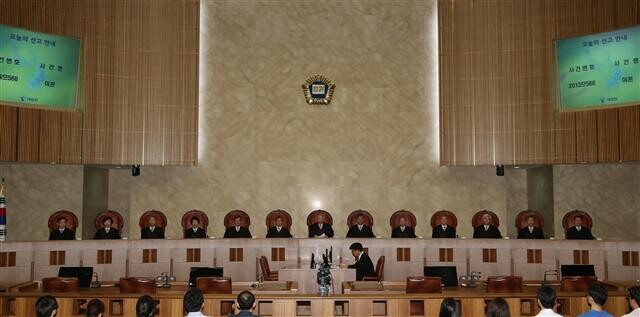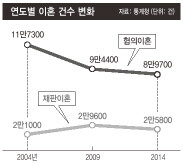hankyoreh
Links to other country sites 다른 나라 사이트 링크
Supreme Court upholds “fault divorce” system

The question of whether a spouse who has committed adultery should be allowed to file for divorce was reviewed for the first time by the full panel of the Supreme Court, but the court decided to uphold the “fault divorce” system outlined by legal precedent. According to this system, a court may not grant a divorce when the petitioner is the spouse responsible for the breakdown of the marriage.
However, six of the 13 Supreme Court justices opposed the decision, arguing in the minority opinion that, if a marriage has already effectively ended, the two individuals should be allowed to leave the legal relationship. The close decision suggests that the issue will remain a controversial social topic for some time to come.
The decision was made in a divorce proceeding initiated by a 68-year-old man identified by the initial K against his 66-year-old wife identified by the initial N. K has been living apart from his wife for around 15 years and even has a daughter with another woman. In the case, the full panel of the Supreme Court, with Hon. Kim Yong-deok presiding, upheld the ruling of the lower court, which had ruled against the plaintiff.
“When the spouse who is responsible for breaking up the marriage asks for a divorce on the grounds of that marriage breaking up, that’s a violation of the principle of good faith,” the court found. Good faith is the legal principle that requires people to act with sincerity so as not to violate the trust of other people.
“If the courts were to widely grant divorces to spouses who are at fault for breaking up a marriage, the spouses who are at not at fault would have to face the brunt of various disadvantages, including the difficulty of supporting themselves and raising their children. At the current time, the courts cannot accept such petitions for divorce.”

A number of Western countries have opted for “no-fault divorce,” in which courts grant divorce even when the petitioner is the spouse at fault, provided that there is an irreparable breakdown of the marriage. But the Supreme Court ruled that this would be premature in South Korea because of the country’s social and economic conditions.
The US and Germany have legal systems in place to deny divorce when there are concerns that it would leave the other spouse and children destitute or to require the spouse who is at fault to provide alimony or child support after the divorce. These systems do not exist in South Korea.
The court also added that, while trial divorce is the only option in countries that have adopted no-fault divorce, South Korea also permits divorce by mutual consent, which means that the spouse who is at fault can try to persuade his or her spouse to end the marriage.
Responding to arguments that women would not be disadvantaged by no-fault divorce if it were introduced to complement the system of dividing assets and improving women’s status, the Supreme Court said that “there is not enough evidence to conclude that gender equality has been achieved in every area of society and the economy.”
The majority opinion was framed by six justices - Lee In-Bok, Lee Sang-Hoon, Park Poe-Young, Jo Hee-de, Kwon Soon-il, and Park Sang-ok ? who were joined by Chief Justice Yang Sung-tae, who cast the deciding vote.
However, the Supreme Court did slightly increase the number of cases in which a petition for divorce could be granted to the spouse at fault. Legal precedent shows that courts have granted divorces when the other spouse was also unwilling to continue the marriage. In such cases, there is no need to worry that one spouse is trying to arbitrary drive the other spouse out of the marriage.
In addition to this ground for divorce, the Supreme Court added that courts could allow divorce in special circumstances, such as when the spouse at fault is taking care of the other spouse and children to such an extent that it cancels out their fault, or when enough time has passed that the guilt of the spouse at fault and the mental pain of the other spouse have faded. The Supreme Court explained that courts must make these decisions by taking into account the degree of responsibility of the spouse at fault, the will and feelings of the other spouse, the period of separation, and the extent to which the other spouse’s lifestyle can be maintained.
Attorneys specializing in family affairs explain this decision by noting that no-fault divorce has not yet been discussed as extensively as the adultery law. The Constitutional Court upheld the constitutionality of the adultery law four times before it finally struck it down earlier this year. That suggests how much social discussion needed to take place before the law could be repealed.
In contrast, this was the first time that the question of introducing no-fault divorce was handled by the full panel of the Supreme Court.
“Prior to this, the Supreme Court did not take an active stance on this issue. It’s significant, however, that six justices sided with the dissent. Discussion of this issue is likely to continue, and it’s possible that such discussion could ultimately lead to the courts adopting no-fault divorce,” said Lee Hyeon-gon, an attorney with the law firm Jiu.
“The general trend is society is toward no-fault divorce, but I get the impression that the Supreme Court justices ? most of whom are men who are 50 years old or older ? balked out of concerns for the side effects of no-fault divorce,” said one lawyer who spoke on condition of anonymity.
“Even though the adultery law has been abolished, couples are still required by civil law to be faithful and to work together. The question of whether to grant a divorce to a spouse who has violated these requirements is a separate question from criminal prosecutions for adultery. The abolition of the adultery law and the preservation of fault divorce don’t contradict each other,” said Kim Tae-ui, a lawyer working for a firm called Bareun.
By Lee Kyung-mi, staff reporter
Please direct questions or comments to [english@hani.co.kr]

Editorial・opinion
![[Column] Has Korea, too, crossed the Rubicon on China? [Column] Has Korea, too, crossed the Rubicon on China?](https://flexible.img.hani.co.kr/flexible/normal/500/300/imgdb/original/2024/0419/9317135153409185.jpg) [Column] Has Korea, too, crossed the Rubicon on China?
[Column] Has Korea, too, crossed the Rubicon on China?![[Correspondent’s column] In Japan’s alliance with US, echoes of its past alliances with UK [Correspondent’s column] In Japan’s alliance with US, echoes of its past alliances with UK](https://flexible.img.hani.co.kr/flexible/normal/500/300/imgdb/original/2024/0419/2317135166563519.jpg) [Correspondent’s column] In Japan’s alliance with US, echoes of its past alliances with UK
[Correspondent’s column] In Japan’s alliance with US, echoes of its past alliances with UK- [Editorial] Does Yoon think the Korean public is wrong?
- [Editorial] As it bolsters its alliance with US, Japan must be accountable for past
- [Guest essay] Amending the Constitution is Yoon’s key to leaving office in public’s good graces
- [Editorial] 10 years on, lessons of Sewol tragedy must never be forgotten
- [Column] A death blow to Korea’s prosecutor politics
- [Correspondent’s column] The US and the end of Japanese pacifism
- [Guest essay] How Korea turned its trainee doctors into monsters
- [Guest essay] As someone who helped forge Seoul-Moscow ties, their status today troubles me
Most viewed articles
- 1[Column] The clock is ticking for Korea’s first lady
- 2Hong Se-hwa, voice for tolerance whose memoir of exile touched a chord, dies at 76
- 3After 2 months of delayed, denied medical care, Koreans worry worst may be yet to come
- 4[Column] Has Korea, too, crossed the Rubicon on China?
- 5Samsung barricades office as unionized workers strike for better conditions
- 6US overtakes China as Korea’s top export market, prompting trade sanction jitters
- 7All eyes on Xiaomi after it pulls off EV that Apple couldn’t
- 8[Guest essay] How Korea turned its trainee doctors into monsters
- 9[Editorial] As it bolsters its alliance with US, Japan must be accountable for past
- 10[Correspondent’s column] In Japan’s alliance with US, echoes of its past alliances with UK